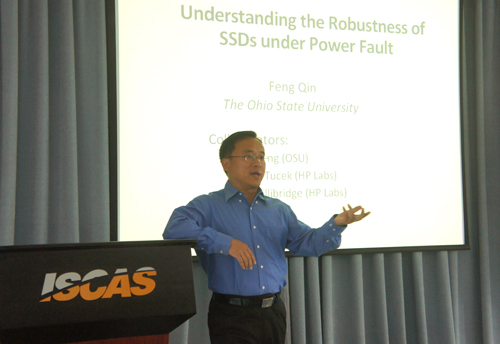Prof. Feng Qin Visits Institute of Software
Date:2013-06-28
Prof. Feng Qin paid a visit to the Institute of Software (ISCAS) at the invitation of Technology Center of Software Engineering on June.20th, 2013.
Feng Qin received his Ph.D. degree from the University of Illinois at Urbana-Champaign. He joined the Department of Computer Science and Engineering at Ohio State as an Assistant Professor in 2006. He was promoted to Associate Professor in 2013. His research interests include Software Reliability, Operating Systems, High Performance Computing, and Security. He is particularly interested in developing system mechanisms to improve software availability and reliability at different software development stages. He has published papers in top system conferences in recent years. One of his papers was awarded as best papers in SOSP'05. Two of his papers won IEEE Micro Top Picks in 2004 and 2007, respectively. Three of his papers were nominated as best papers in HPCA'05, SC'07, and SC'10, respectively. He has received NSF CAREER Award in 2010.
Prof. Feng Qin delivered a report at ISCAS during his visit. The title of this report was “Understanding the Robustness of SSDs under Power Fault”.
Modern storage technology (SSDs, No-SQL databases, commoditized RAID hardware, etc.) bring new reliability challenges to the already complicated storage rack. Among other things, the behavior of these new components during power faults - which happen relatively frequently in data centers - is an important yet mostly ignored issue in this dependability-critical area.
In this talk, Prof. Feng Qin presented their recent work on exposing reliability issues in block devices under power faults. He introduced their testing framework for detecting failures of SSDs under Power Fault. The framework includes specially-designed hardware to inject power faults directly to devices, workloads to stress storage components, and techniques to detect various types of failures. He also shared their most recent test results with the audience. By applying their testing framework to fifteen commodity SSDs, they have surprisingly found that thirteen out of the fifteen devices exhibit failure behavior contrary to their expectations.
The audience had a heated discussion with Prof. Feng Qin in the end of the report.

Prof. Feng Qin reported
